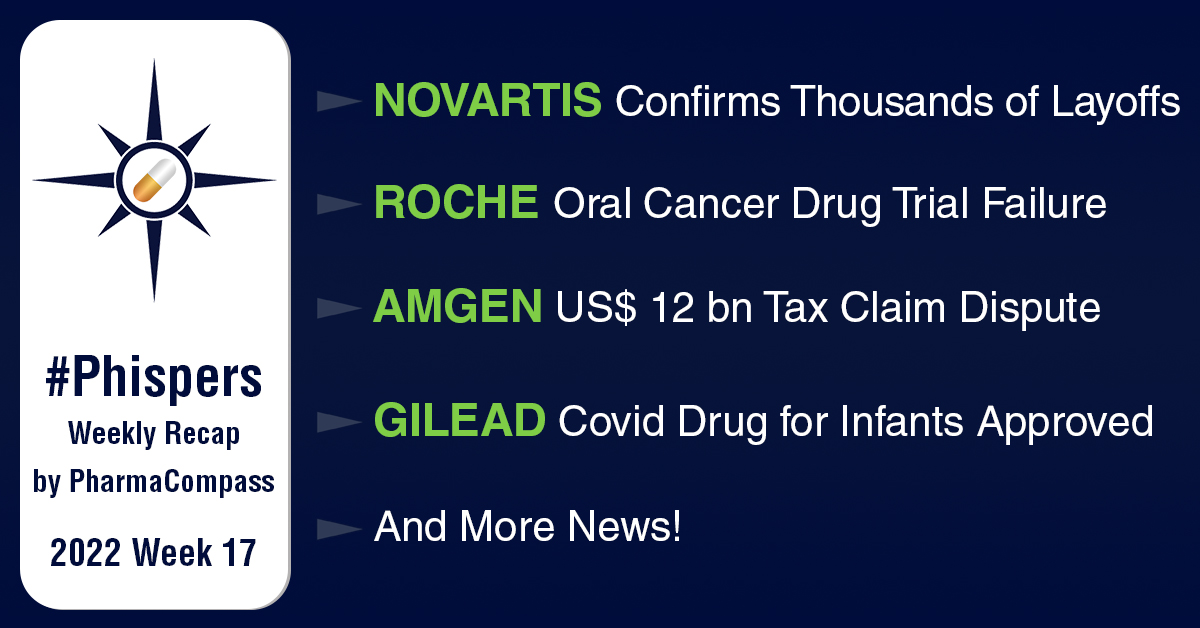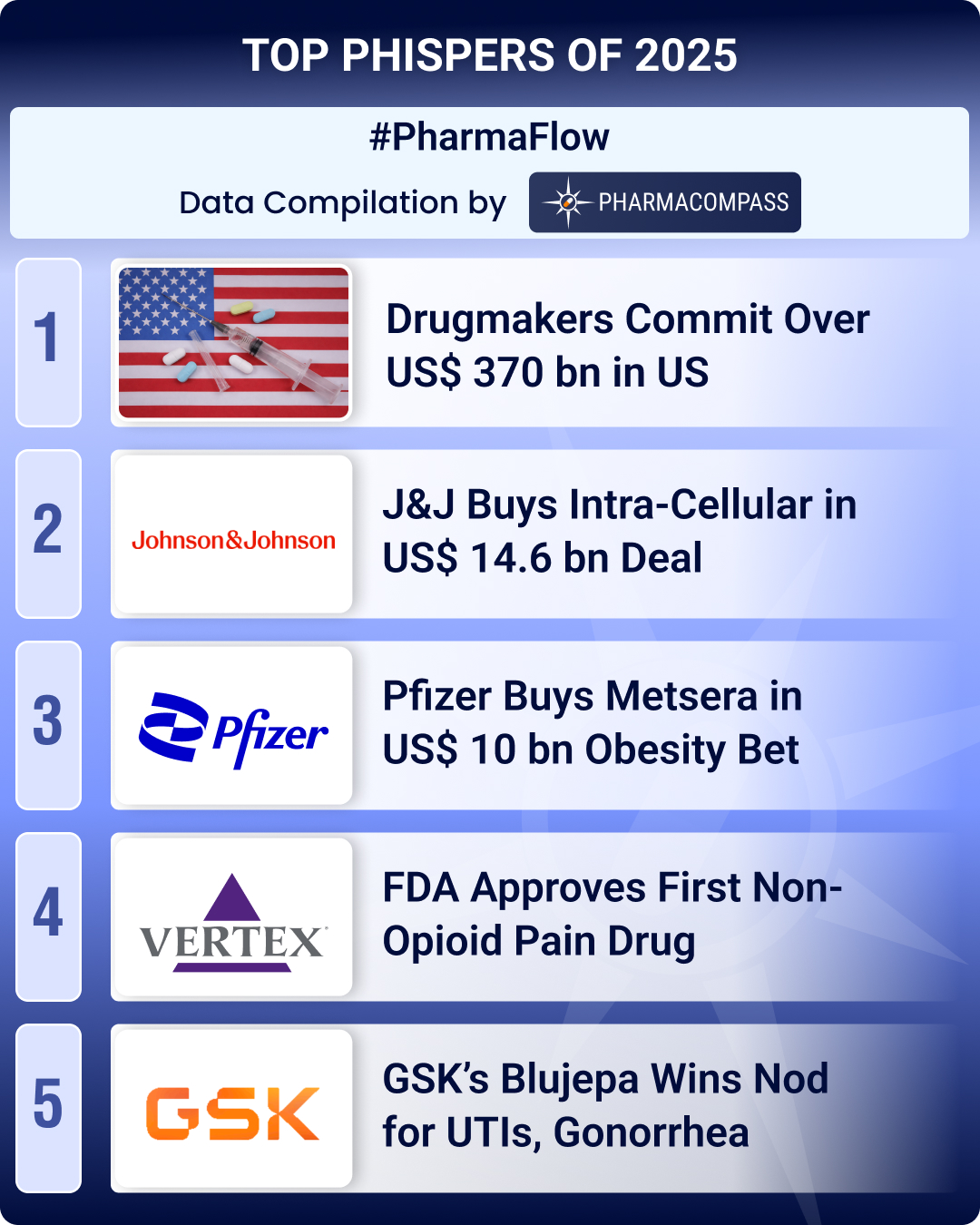
By PharmaCompass
2022-04-28
Impressions: 2,372 Article
Three weeks after announcing the merger of its pharmaceuticals and oncology units into an innovative medicines (IM) unit, Swiss pharma Novartis has confirmed it will lay off thousands of employees as part of the restructuring. Another company planning to lay off employees is Nektar. It has suspended all trials of its key cancer drug bempegaldesleukin and ended its partnership with BMS, and has said it plans to retrench over 500 employees.
Roche’s experimental oral breast cancer drug – giredestrant – has failed to slow the progression of the disease in a phase 2 clinical trial. Last month, a similar drug from rival Sanofi – amcenestrant – had failed a phase 2 trial.
In Covid-19 news, Gilead’s antiviral drug Veklury (remdesivir) became the first drug to treat children aged 28 days and older who are either hospitalized or are at risk of the disease progressing to a severe form. Pfizer and BioNTech have requested the US Food and Drug Administration (FDA) to authorize a Covid-19 booster shot for children between five and 11 years of age.
Amgen is disputing a US$ 12 billion claim (that includes back taxes and penalties) made by America’s Internal Revenue Service (IRS) that is tied to how the company transfers its profits from the US to Puerto Rico. And J&J has filed a lawsuit against several drug distributors and pharmacies, alleging that they are selling counterfeit versions of its HIV drugs.
Meanwhile, the FDA has accepted a priority review application for AstraZeneca’s cancer drug candidate — tremelimumab — used in combination with Imfinzi for patients with unresectable hepatocellular carcinoma (HCC), the most common type of liver cancer. Pfizer and French vaccine maker Valneva have said a phase 2 pediatric trial of their Lyme disease vaccine candidate – VLA15 – found that the vaccine works better in children as compared to adults.
In recall news, Pfizer recalled five batches of its blood pressure drug Accupril (Quinapril HCI) due to presence of high levels of a nitrosamine impurity – N-nitroso-quinapril. Pfizer Canada has also recalled the drug for the same reason.
Novartis confirms news of ‘thousands of layoffs’; hires Ronny Gal to drive M&As
Two weeks ago, we had quoted a Swiss newspaper (Tages-Anzeiger) report that said Novartis will cut thousands of jobs as part of its organizational makeover, merging its pharmaceuticals and oncology units into an innovative medicines (IM) unit. This week, the Swiss drugmaker has confirmed that thousands of jobs will indeed go under the axe.
“As a broad range, we expect a number in the single digit thousands of roles across the company would be impacted by these changes,” a Novartis spokesperson told Fierce Pharma.
The company did not confirm an exact number, saying the final figure will depend on the organizational restructuring. Novartis didn’t say which job roles will be affected, but said some affected employees will be able to switch to open roles.
Novartis expects the new structure to be fully in place and operational by the end of 2022. The Swiss drugmaker’s first quarter core operating income rose 3 percent to US$ 4.08 billion. The growth is attributed to a rebound at Sandoz (Novartis’ generic drugs unit) and a surge in prescriptions for heart failure treatment Entresto.
Meanwhile, in a surprising move, CEO Vas Narasimhan has hired Wall Street analyst Ronny Gal to oversee the company’s corporate strategy, R&D portfolio optimization and business development. The pharma giant hopes that Gal’s knowledge of therapeutic areas, technology platforms, clinical development and US market dynamics will help shape its overall strategy, prioritize its internal pipeline and drive M&As. Gal has over 20 years of experience – including 17 years at Bernstein – in the life sciences industry. He will join the company by August 1.
Weeks after Sanofi’s trial fiasco, Roche’s oral breast cancer drug fails phase 2 study
In a major setback, Roche’s experimental oral breast cancer drug – giredestrant – failed to slow disease progression in a phase 2 clinical trial, the Switzerland-based pharma said.
This is the second such failure in over a month for a new class of drugs – known as selective estrogen receptor degraders (SERDs) – designed to fight tumors that grow in response to estrogen. Last month, Roche’s rival Sanofi had reported a similar failure in a phase 2 trial of its oral breast cancer drug – amcenestrant.
Giredestrant failed to meet its primary endpoint of meaningfully extending progression-free survival in previously treated ER-positive Her2-negative breast cancer patients, Roche said. The company plans to present the results from the study at a medical meeting later this year.
Meanwhile, the Basel-headquartered pharma said Russia’s attack on Ukraine has disrupted the development of a new generation of multiple sclerosis drugs. Apart from ongoing trials of launched multiple sclerosis drug Ocrevus, about 20-30 percent of patients in the fenebrutinib trial program are from Ukraine and Russia, it said.
Amgen disputes IRS’ US$ 12 billion claim tied to its Puerto Rico manufacturing unit
Last year, America’s Internal Revenue Service (IRS) had claimed that Amgen owed US$ 3.6 billion in back taxes for the three-year period between 2010 and 2012. The IRS had also proposed adjustments to the company’s taxes between 2013 and 2015 and informed the pharma of an incoming audit for the 2016 to 2018 period. At that time, Amgen had filed a petition in the US tax court to contest the adjustments for 2010 to 2012.
This week, the California-based pharma said the IRS has asked for US$ 5.1 billion in back taxes, excluding interest, and another US$ 2 billion in penalties for the period between 2012 and 2015. This is related to how Amgen transfers its profits from the US to Puerto Rico, where the company houses most of its manufacturing. In total, the amount adds up to around US$ 12 billion.
The pharma plans to file another petition to contest the latest adjustments. “We strongly believe the IRS’ position is without merit,” Amgen chief financial officer Peter Griffith said. Amgen believes that the IRS adjustments for the 2013 to 2015 period are overstated by approximately US$ 2 billion.
After ending oncology partnership with BMS, Nektar to cut over 500 jobs
Last week, Nektar had stopped all trials of its key cancer drug bempegaldesleukin, including those used in combination with Bristol Myers Squibb’s cancer drug Opdivo, after the drug failed to meet its main goals in multiple studies. Following the failures, the drugmaker had called off a US$ 3.6 billion cancer drug development partnership with BMS.
This week, Nektar said it will lay off about 70 percent of its workforce, or over 500 employees, as part of a reorganization. Nektar’s chief medical officer Dimitry Nuyten and chief commercial officer John Northcott are also stepping down as part of the rejig.
The layoffs will help it save between US$ 150 million and US$ 160 million, which will go towards funding the development of its most promising drug candidates.
FDA approves Gilead’s Veklury for treating Covid-19 in babies 28 days old
In October 2020, Gilead’s antiviral drug Veklury (remdesivir) became the first drug to be approved by the FDA to treat Covid patients. Eighteen months on, it has become the first Covid-19 drug to treat children younger than 12 years.
The FDA has expanded the approval of Veklury to include children aged 28 days and older and weighing three kg who are either hospitalized with Covid or are at risk of the disease progressing.
The approval is backed by data from a phase 2/3 study of 53 hospitalized pediatric patients. By the tenth day, 75 percent of the children had clinical improvement and around 60 percent had been discharged from the hospital, the study found.
Last week, the World Health Organization (WHO) recommended Veklury for use in mild to moderate Covid-19 patients who are at a higher risk of hospitalization following results from a clinical trial.
Pfizer seeks FDA nod for booster shot in five to 11 year olds: Pfizer and BioNTech have requested the FDA to authorize a Covid-19 booster shot for children aged between five and 11 years. The partners submitted an EUA application after a study showed a booster shot generated a strong immune response among healthy children in this age group. Pfizer-BioNTech’s vaccine Comirnaty is the only Covid-19 shot authorized for children.
WHO recommends Paxlovid: The WHO has recommended the use of Pfizer’s antiviral pill Paxlovid in high-risk patients with mild-to-moderate Covid-19. The UN agency endorsed the pill after data from two trials showed the drug reduced the risk of hospitalization by 85 percent. It, however, raised concerns about the availability of the drug in low- and middle-income countries and the lack of price transparency.
The US government, which has purchased 20 million courses of Paxlovid, is working with Pfizer to increase the manufacture and supply of the pills with the aim to double the number of pharmacies distributing the pill for free from 20,000 to 40,000.
Vaccines for younger kids delayed by incomplete data: Under pressure from US lawmakers questioning the delay in vaccine approval for children under five years, the FDA said it has not yet cleared a shot because the vaccine makers have not completed their applications for authorization. The FDA may not approve a pediatric vaccine dose for that group until June.
Pfizer-Valneva’s Lyme disease vaccine shows better results in children
American drugmaker Pfizer and French vaccine maker Valneva said a phase 2 pediatric trial of their Lyme disease vaccine candidate – VLA15 – has found that the vaccine works better in children as compared to adults.
In February, the duo had reported that the vaccine was immunogenic in adults between 18 and 65 years of age after a three-dose regimen. The partners found that the vaccine performed better in children between the ages of five and 17 years, as compared to adults. No vaccine-related adverse events were reported.
The drugmakers now plan to include children above five years in a phase 3 trial of the vaccine, scheduled to begin in the third quarter. The duo said the immunogenicity and safety data support a three-dose vaccination schedule in children in the phase 3 study.
Pfizer recalls blood pressure drug over nitrosamine impurity: In March, Pfizer had recalled several lots of its blood pressure drug Accuretic in the US and Canada after higher-than-approved levels of the potential cancer-causing impurities – N-nitroso-quinapril – were detected.
Last week, the same nitrosamine impurity was back to haunt the drugmaker.
The New York-based pharma recalled five batches of its Accupril (Quinapril HCI) blood pressure tablets due to the presence of high levels of N-nitroso-quinapril. The recalled lots containing 10mg, 20mg and 40mg tablets were distributed in the US and Puerto Rico. Each lot contains 90-count bottles. Pfizer Canada also recalled all lots of three doses of Accupril for the same reason.
J&J moves court accusing drug distributors of selling counterfeit HIV drugs
In January, Gilead had claimed that an unauthorized network of drug distributors and suppliers had sold pharmacies over US$ 250 million worth of counterfeit versions of its HIV treatments. The pharma had found 85,247 fake and/or tampered bottles in 17 locations across nine states of the US.
Now, Johnson & Johnson has alleged that several drug distributors and pharmacies are selling counterfeit versions of its HIV drugs. In its lawsuit, J&J alleged that some drug distributors – SafeChain Solutions, ProPharma Distribution, Scripts Wholesale and I Care Pharmacy 14 – have sold large quantities of counterfeit HIV medications.
The company claimed that bottles labeled as one drug were filled with pills of a different HIV medicine, and in one case, it included a drug to treat conditions such as schizophrenia and bipolar disorder. J&J is seeking US$ 25 million from each of the defendants. J&J has also sought banning the defendants from selling any of its products.
FDA grants priority review status to AstraZeneca’s liver cancer drug
After a series of failures over the years, AstraZeneca’s cancer drug candidate tremelimumab seems to be making its way towards success.
A few months ago, the British-Swedish drugmaker posted positive results for tremelimumab from a trial in non-small cell lung cancer (NSCLC). This week, the pharma said the FDA has accepted a priority review application for the drug in combination with its PD-L1 inhibitor Imfinzi for patients with unresectable hepatocellular carcinoma (HCC) that can’t be treated with surgery.
HCC is the most common type of liver cancer that affects around 26,000 people every year in the US. Astra said it has also submitted a supplemental biologics license application (BLA) for Imfinzi in this indication. The FDA is also reviewing an Imfinzi-tremelimumab-chemo combination which has been found to extend the lives of patients with stage IV or metastatic NSCLC, the company said.
The PharmaCompass Newsletter – Sign Up, Stay Ahead
Feedback, help us to improve. Click here
Image Credit : Phisper Infographic by SCORR MARKETING & PharmaCompass is licensed under CC BY 2.0
“ The article is based on the information available in public and which the author believes to be true. The author is not disseminating any information, which the author believes or knows, is confidential or in conflict with the privacy of any person. The views expressed or information supplied through this article is mere opinion and observation of the author. The author does not intend to defame, insult or, cause loss or damage to anyone, in any manner, through this article.”







